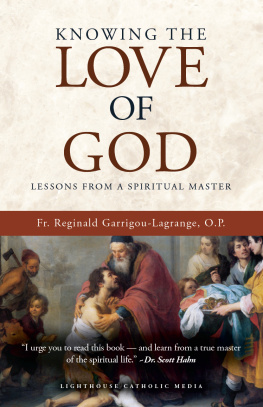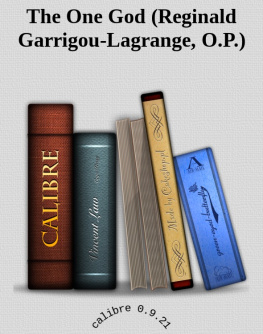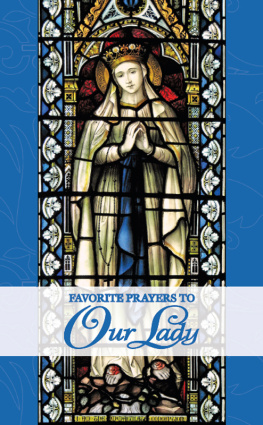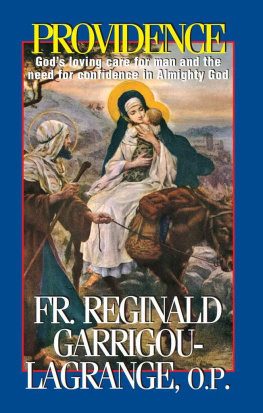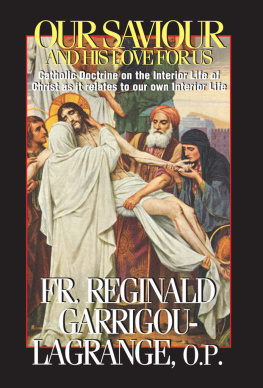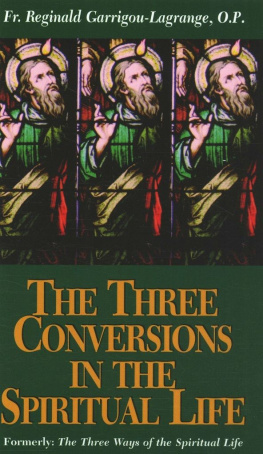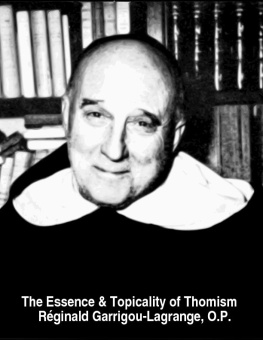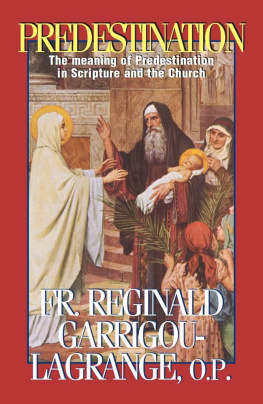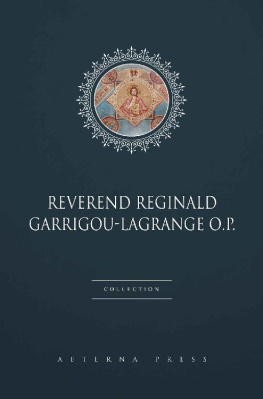THE TRINITY AND
GOD THE CREATOR
Reginald Garrigou-Lagrange, O.P.
Edited by
Paul A. Ber, Sr.
Veritatis Splendor Publications
et cognoscetis veritatem et veritasliberabit vos
The contents of The Trinity andGod the Creator by Reginald Garrigou-Lagrange, OP are in the public domain. However, this version is copyrighted.
Copyright 2012. VeritatisSplendor Publications.
All Rights Reserved.
DEDICATION
AD MAJOREM DEI GLORIAM
For Lynne, Paul, Margaret,Michael, Juan, and Lily
Index
THE TRINITY AND GOD THECREATOR
Garrigou-Lagrange
Preface
In his motu proprio,, of June 29, 1914, Pope Pius X commanded that theuniversities and institutions of learning which were empowered to grantacademic degrees and the doctorate in sacred theology should use the of St. Thomas as their text.
On March 7, 1916, the SacredCongregation of Seminaries and Universities interpreted this decree as follows:"The of St. Thomas must be accepted as the textfor the lectures inasmuch as they treat of the scholastic part of thequestions. The method to be followed is this: the isto be consulted frequently and explained together with some other text whichpresents the logical order of the questions and the positive teaching"(, VIII, 157).
To meet this demand, we havealready published three treatises: . The first part of this present work treats of theTrinity. After presenting the testimony of the Scriptures and the Fathers, weexplain the questions in St. Thomas' , article byarticle, comparing his doctrine with the teaching of earlier and latertheologians.
We have laid great stress onSt. Thomas' concept of relation because from it flow all the other conclusionsin this treatise, and these conclusions will appear to be in accord with thefundamental thesis of the Thomistic treatise on the one God which establishesthat God is self-subsisting Being and that consequently there is but one naturein Him although the real relations in God are really distinct from one another.
In this way we shall showhow St. Thomas perfected St. Augustine's teaching on the Trinity. As St.Augustine solved many difficulties remaining in the doctrine of the GreekFathers on the Trinity, so St. Thomas explained many of St. Augustine's doubtsabout the processions, relations, and persons. This will become abundantlyclear as we proceed to the different parts of the present treatise. We shallgive particular attention to the indwelling of the Holy Trinity in the souls ofthe just.
With regard to the questionson creation, the distinction of things, their preservation, and on evil, weshall explain each article because they are all of great importance. In thetreatises on the angels, corporeal creatures, and man, we shall study only themore important questions, laying special emphasis on the principles which throwlight on the whole matter. It is well to descend from these principles to theconclusions and then rise from the conclusions to the principles, so that theunity of our science will become clear and that our study may dispose to acontemplation of divine things and to a true union with God.
We hope that in some degreeat least we shall attain the goal envisaged by the Vatican Council: "Humanreason illumined by faith, when it inquires diligently and piously andsincerely, will with God's help attain to a most fruitful understanding of themysteries both from the analogies of those things which it knows naturally andfrom the interconnection between the mysteries themselves and between themysteries and man's ultimate end."
THE TRINITY
Introduction
1. The Importance Of ThisTreatise
If we read the Fathers ofthe Church and the ancient theologians, I we shall see that for them the dogmaof the Trinity, however obscure it may have been for them, was of the greatestimportance. Thus Tertullian[1] asked: "What is the substance of the NewTestament, except that the Father, the Son, and the Holy Ghost, believed to bethree, are one God?" The words of St. Hilary[2] on this mystery, expressedin the sign of the cross, with which Christians sign themselves, have beenquoted many times; "This is what the Church understood, what the synagoguedid not believe, what philosophy could not grasp." The dogma of theTrinity, therefore, is that fundamental truth by which believing Christians aredistinguished from the Jews and pagans.
Both the Greek and the LatinFathers wrote long treatises on the Trinity, at first as positive andapologetic theology and later as speculative theology. Among the Greek Fatherswe find St. Athanasius,[3] St. Basil,[4] St. Gregory Nazianzen,[5] St. Gregoryof Nyssa,[6] Didymus,[7] Cyril of Alexandria,[8] St. John Damascene;[9] andamong the Latin Fathers, St. Hilary,[10] St. Ambrose,[11] St. Augustine,[12]St. Fulgentius,[13] and Boetius.[14]
Among the Scholastics, allthe great theologians and their commentators wrote speculative treatises on theTrinity; among modern positive theologians, Petau and Thomassin wrote at lengthon this dogma. Finally, the more recent theologians have accorded this dogmathe same importance, as Franzelin, Scheeben,[15] Kuhn, Billot, Buonpensiere, deRegnon[16] (who wrote four volumes, 1892-98), and J. Lebreton.[17] FatherJugie's recent work is based on the sources of revelation and the teachings ofthe dissident Oriental Churches.[18] A. d'Ales wrote his in 1934; P. Galtier wrote in 1933;L. Choppin, in 1925; F.Cavalerra, in 1925,and M. Schmaus, in1927.[19]
In view of this theologicalactivity it is surprising that toward the end of the last century the questionof the importance of this dogma should have arisen.[20] With regard to thisquestion three positions may be distinguished.
Certain Protestants, holdingthat this mystery is incomprehensible, declared that God revealed it as anenigma to humble human reason, which seeks to measure all things according toits own principles, and not in order to perfect our intellects by sublime andfruitful knowledge.
This position, which is inopposition to the whole tradition of the doctors, exaggerates and distorts atruth. It is indeed true that in the revelation of this mystery God shows usthat His intimate life and His divinity transcend even our highest and mostuniversal analogical concepts, the concepts of being and unity. For the Deityas such, naturally unknowable, is in a sense above the being and unity whichare naturally knowable, as Cajetan said so well.[21] The revelation of themystery of the Trinity shows that the Deity is also above the absolute and therelative for, as we shall see, the Deity as it is in itself is not reallydistinct from the divine relations, from paternity, filiation, and spiration.Thus it is not something merely absolute nor merely relative, but somethingabove these, the supreme enigma. But must we conclude that the manifestation ofthis enigma was intended solely to humble our reason and not also to perfectand illuminate it?
Many other Protestantsduring the nineteenth century, and some Catholics too, like Hirscher, declaredthat this dogma indeed illuminated our minds, but only in an extrinsic manner.They thought that for us the Trinity had no intrinsic importance, but that itserved only to obviate contradictions in the other mysteries of the incarnationof the Son of God and the sending of the Holy Ghost, which in themselves are ofgreat value to us.
The basis of this position,as its authors declared, is that the dogma of the Trinity taken intrinsically,prescinding from the other truths with which it is connected, cannot perfectour inner life, our faith, hope, and charity. They argue as if it mattered notto our interior life whether we believe that there are four divine persons, orthat the divine persons are not really distinct from one another. Since,according to these men, God did not reveal this mystery because of itsintrinsic validity, any theological attempt to penetrate it is futile, andtherefore the treatise on the Trinity is merely an introduction to thetreatises on the redemptive Incarnation and the mission of the Holy Ghost,which perfect our faith, hope, and charity.


